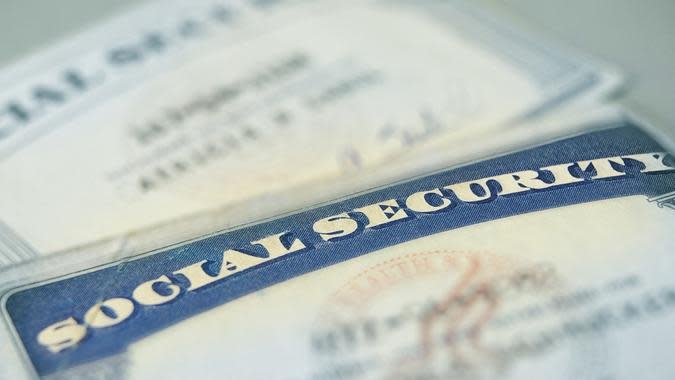15 Money Myths That Can Destroy Your Retirement

According to a GOBankingRates survey, 64% of Americans will retire broke. Furthermore, the annual Retirement Savings survey found that 46% of respondents had $0 tucked away for their golden years.
Related: 35 Retirement Planning Mistakes That Waste Your Money
See: The Downsides of Retirement That Nobody Talks About
If you’re late to the retirement savings game, or simply don’t think you have enough money saved up to live your American Dream comfortably after you stop working, it may be time to revisit some of your beliefs about saving money and investing. From postponing savings contributions to assuming health insurance and Social Security will have you covered, you’ll want to change some of your beliefs about money immediately -- or risk jeopardizing your retirement savings.
Discover: 27 Best Strategies To Get the Most Out of Your 401(k)
Find out the biggest retirement mistakes you're making that are actually myths.
Last updated: Sept. 22, 2021

Myth 1: It’s Too Late To Start Retirement Planning
While it’s a good idea to be contributing to a retirement fund as early in your working years as possible, you can start putting away money for your nest egg at any age. One benefit of making contributions to a retirement account when you’re at least 50 years of age or older is your contribution limit increases.
Check Out: 50 Things Every 50-Something Should Know About Retirement

Myth 2: Medicare Will Cover My Healthcare Expenses During Retirement
HealthView Insights reports that the total projected lifetime healthcare cost for a 65-year-old retiring with Medicare coverage and supplemental and dental insurance would be $321,994, as of 2017. According to these projections, that number will grow to $404,523 when deductibles, hearing, vision, copays and dental cost sharing are added in. If you aren’t making a sincere effort to build up your retirement savings now, you may not have enough in the bank to cover basic health care costs -- even with Medicare.
Read: What It Takes To Save $1 Million for Retirement

Myth 3: I Can’t Make and Save More Money Without Working
Think you need to maintain a part-time job or rely on another source of income to build up that retirement fund? Think again. You could buy a Multi-Year Guaranteed Annuity (MYGA) that will earn you a guaranteed amount of compound interest for a certain number of years. Jonathan Clements, author of the “Jonathan Clements Money Guide 2015," tells The Wall Street Journal retirees should, “consider making a series of smaller annuity purchases over the course of five or 10 years -- which you can stop if your health deteriorates. This will also allow you to spread your purchases among multiple insurers, so you won’t be left in a lurch if any one insurer gets in financial trouble.”
You could buy a 5-year MYGA, for example, for a lump sum payment of $75,000 that’s currently sitting in a low-interest savings account, to guarantee a steady stream of income for the next five years. This would help you build up your savings rapidly -- and without having to clock in more work hours.
Yes, They Exist: Jobs That Are Perfect for Retirees

Myth 4: I’ll Make Up For Missed Retirement Savings Later
Maybe you’re waiting for a higher-paying job, attractive returns on stock investments, or a financial miracle before you start building up that retirement savings account. Big mistake. If you expect to generate any type of benefits from accounts that can earn you compound interest, you need to start saving as early as possible -- as early as yesterday. Consider speaking with a financial advisor to learn about your best options for contributing to an interest-bearing account that can help you start earning money today.

Myth 5: I Can’t Be Making Risky Investments Right Before Retirement
You might not have a strong track record of success playing the stock market but you can still generate attractive returns on certain types of investments as part of your retirement planning strategy. If you’re close to retirement, it’s likely that you don’t want to turn to high-risk (and high-yield) investments in the event the markets don’t perform well enough by your retirement date. At that age, you can afford to make some low-risk investments with a portion of your untouched savings.
One option is to participate in a lending platform where you loan money to small business owners or individuals and earn an attractive return on your investment. This type of investment isn’t as low-risk as say, a bank CD, but it can help you generate some extra money for your retirement fund sooner than you think.

Myth 6: I’ll Be Able To Live On Much Less When I’m Retired
If your excuse for neglecting your retirement savings is that you don’t really need that much money to be happy or you expect your cost of living to drastically decrease, you could be setting yourself up for a big disappointment when you finally say goodbye to the paycheck.
Consider the effects of inflation and any changes in your spending habits in the next few decades -- if you plan on traveling, moving to a new home, or even relocating, it’s likely that you will need extra funds to make those dreams come to life. And, consider that your mortgage may not be paid off or you acquire a new mortgage. In 2016, housing accounted for 36.5% of average annual expenditures at age 75, according to the U.S. Bureau of Labor Statistics. That’s a significant number, no matter where you live.

Myth 7: My Retirement Funds Will Be Managed By My Spouse or Partner By Default When I Die
If you haven’t taken the time to draft a living will or outline exactly how you want your retirement funds -- and any other financial assets you own -- distributed upon your death, there is a risk that your significant other may not see your hard-earned dollars. Make sure you’ve taken the time to consult with a financial planner to put together clear instructions about the divisions of assets and information pertaining to your funeral and final wishes. Some of your retirement savings could be used to set up a funeral trust or donated to a charity or fund of your choice.
Read On: Where Your Money Goes After Life's Biggest Curveballs

Myth 8: My Health Insurance Will Cover Me If I Get Very Sick
If you are diagnosed with a critical illness or get into a serious accident, there’s a good chance that your health insurance policy will deny certain claims or only partially pay for health care expenses. If you have a plan under the Affordable Care Act, you could be paying anywhere from $2,159 to $6,904 in out-of-pocket health care costs before you meet your deductible. Being diagnosed with cancer or other serious health conditions means you could also be paying for many medical services not covered by your Obamacare plan. If you don’t have money set aside for medical or health emergencies -- or some type of critical illness insurance plan that covers all costs upon diagnosis-- you may end up struggling with medical debt for years to come.

Myth 9: I’m Too Young To Be Thinking About Retirement
Baby boomers and soon-to-be-retirees typically have retirement planning at the top of their agenda, but what about Millennials and younger generations? If you expect to build up a substantial retirement fund a few decades from now, your best bet is to start early. Putting away a percentage of your monthly income into a retirement fund as early as 30 years old means you can take advantage of several years of compound interest -- and with little to no risk. Bottom line: It’s never too early to start saving.
It's Not Too Late: How One Man Saved $1 Million in 5 Years -- And You Can Too

Myth 10: I’ve Been Contributing to My 401(k) for Years … And That’s Enough, Right?
Not exactly. If you’ve been taking advantage of automatic enrollment for a 401(k) plan through your employer, you’ve probably been contributing about 3% of your income towards that retirement fund. However, this isn’t enough. Wade D. Pfau, professor of retirement income at The American College, recommends a 15% contribution rate for a 35-year-old who plans to retire at 65 years of age.

Myth 11: I Have Other Financial Priorities To Take Care Of
Buying a home, paying for college, or paying off student loans and credit card debt may appear to be higher priorities right now, depending on your age and life stage. However, retirement contributions need to be a part of your financial plan regardless of where you are financially -- even if you are only making a modest 1 percent contribution, that’s money that is going towards your future. Keep in mind that most retirement savings accounts are tax-deferred so you can “protect” this money from income taxes as you build your future.

Myth 12: The Market’s Not Doing Well Enough for Me to Even Consider Investing
You don’t need to wait for perfect market conditions to build up your retirement funds. While some people do wait for signs of a strong economy before pursuing higher-risk investments as part of their retirement portfolio, you still have plenty of options with very low-risk investments. At the very least, you could be putting your money into mutual funds that will slowly and steadily build up your savings.

Myth 13: Social Security’s Got Me Covered
You’ve been seeing a chunk of your paycheck going towards Social Security month after month, a benefit that could provide you with one source of income when you stop earning money. However, several government studies and reports indicate that Social Security funds may run out by 2035. Many factors can be attributed to the depletion of the fund, including longer life expectancies, an increased in the number of retirees and a smaller working-age population.

Myth 14: I’ve Already Saved Some Money for Healthcare Expenses in Retirement
Rising health care costs across the board mean you could be setting yourself up for financial struggles come retirement -- especially if you haven’t set aside enough money for one of your biggest expenses: long-term care.
As Frank Armstrong III, founder and principal of Miami-based Investor Solutions points out, long-term care costs are not covered by insurance: “Once a hospital releases you to any kind of long-term care facility, your medical coverage quits paying for your care.” Considering that 70%nof people turning 65 will need some form of long-term care in retirement, according to the U.S. Department of Health and Human Services, you will need at least $100,000 a year to cover your costs, says Armstrong.

Myth 15: I Won’t Live Long Enough To Enjoy My Savings Efforts
If you’re holding off on long-term planning because you think you simply won’t live long enough to enjoy your savings and wealth-building efforts, you may be compromising on a comfortable future. Today’s retirees and the next generation of retirees are expected to live longer than previous generations. A man reaching age 65 today can expect to live until age 84, while a woman turning 65 today can expect to live to more than 86.5 years old, according to the SSA. That means you need to plan for at least 19 years of thriving beyond retirement.
And the proverb, “you can’t take it with you when you die”? Well, technically you can, by leaving a legacy for your loved ones or contributing to a good cause in your name using your retirement savings.
More From GOBankingRates
Social Security Benefits Might Get Cut Early -- What Does It Mean for You?
Here's How Much You Need To Earn To Be 'Rich' in 23 Major Countries Around the World
This article originally appeared on GOBankingRates.com: 15 Money Myths That Can Destroy Your Retirement
